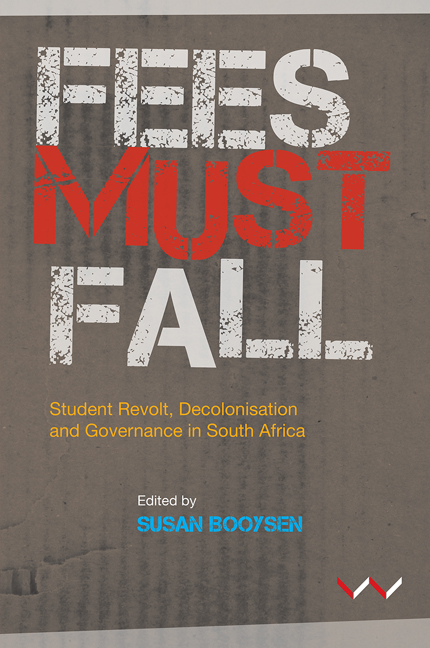Book contents
- Frontmatter
- Contents
- Acknowledgements
- Preface
- Introduction
- PART ONE POWER REDEFINED – ‘WHAT HAPPENED TO GOVERNANCE?’
- PART TWO PRIMARY VOICES – ‘THE ROOTS OF THE REVOLUTION’
- PART THREE THE REVOLT – ‘RISING AGAINST THE LIBERATORS’, SOUTH AFRICA IN AFRICA
- PART FOUR POWER AND CLASS REDEFINED – ‘SIT DOWN AND LISTEN TO US’
- PART FIVE JUSTICE, IDENTITY, FORCE AND RIGHTS – ‘WE CAME FOR THE REFUND’
- Chapter 13 Excavating the vernacular: ‘Ugly feminists’, generational blues and matriarchal leadership
- Chapter 14 The South African student/worker protests in the light of just war theory
- Conclusion: Aluta Continua!
- APPENDICES
- Contributors
- Index
Chapter 13 - Excavating the vernacular: ‘Ugly feminists’, generational blues and matriarchal leadership
from PART FIVE - JUSTICE, IDENTITY, FORCE AND RIGHTS – ‘WE CAME FOR THE REFUND’
Published online by Cambridge University Press: 20 April 2018
- Frontmatter
- Contents
- Acknowledgements
- Preface
- Introduction
- PART ONE POWER REDEFINED – ‘WHAT HAPPENED TO GOVERNANCE?’
- PART TWO PRIMARY VOICES – ‘THE ROOTS OF THE REVOLUTION’
- PART THREE THE REVOLT – ‘RISING AGAINST THE LIBERATORS’, SOUTH AFRICA IN AFRICA
- PART FOUR POWER AND CLASS REDEFINED – ‘SIT DOWN AND LISTEN TO US’
- PART FIVE JUSTICE, IDENTITY, FORCE AND RIGHTS – ‘WE CAME FOR THE REFUND’
- Chapter 13 Excavating the vernacular: ‘Ugly feminists’, generational blues and matriarchal leadership
- Chapter 14 The South African student/worker protests in the light of just war theory
- Conclusion: Aluta Continua!
- APPENDICES
- Contributors
- Index
Summary
INTRODUCTION
In the #FeesMustFall movement, two distinguishing features produce a rupture with the past. The first is that womanhood is a contested space, along with sexual identities. The second is the contestation of forms of leadership, in which representational systems of leadership have been destabilised. These modes of selforganisation and self-expression of students in the #FeesMustFall movement are different to the dominant practices in the recent past of South African social movements. While ‘being woman’ has been the terrain on which feminists in South Africa and globally have countered gendered political identities, the prevalence of diverse sexualities among women on the university barricades – in protests, speeches, marches, meetings and blogs – is a radical discontinuity with the past.
This gendered difference in the #FeesMustFall social movement is producing a radical feminist political praxis that stands in stark contrast to the ‘domesticated feminisms’ that characterise older South African political activists today. In various ways – through elite formation, political incorporation, ageing and political fatigue – most of the older feminists who were part of the democratic transition no longer occupy the spaces on the barricades. This may be seen as a natural cycle of social protest. Leon Trotsky is credited with the saying, ‘Before forty, a revolutionary. After forty, a rogue!’ This chapter contends that the different political positionalities of what I term the ‘new African woman’ vis-à-vis the ‘domesticated feminist’ produces a generational rupture and leads to what I call ‘generational blues’. By this term I imply that instead of the significant chasm that potentially exists between the ‘new African woman’ and the older feminist, the older feminist should be the ‘organic political elder’ of the ‘new African woman’.
My chapter focuses on the ways in which lesser-known coloured feminist activists of the 1980s and the 2010s have challenged their social containment as women in order to give fuller self-expression to their political activism. The 2012–2013 Red Tent research project (Miller 2013a, b, c, d) of the Human Sciences Research Council (HSRC) conducted personal interviews with ten middle-class women from 1980s social movements in the Western Cape; a personal interview with a key woman leader from the Proudly Manenberg organisation active in the 2000s; two focus groups with middle-class African women immigrants in Edinburgh; and working-class women (the dominant profile of the male leader, Mario Wanza, has often overshadowed the role of the women's leadership in Proudly Manenberg).
- Type
- Chapter
- Information
- Fees Must FallStudent revolt, decolonisation and governance in South Africa, pp. 270 - 291Publisher: Wits University PressPrint publication year: 2016



